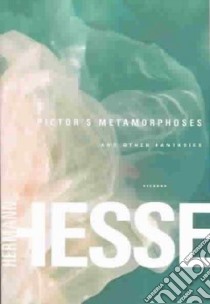Pictor's Metamorphoses - 9780312422646
Un libro in lingua di Hermann Hesse Theodore Ziolkowski Lesser Rika (TRN) edito da Picador USA, 2003
- € 17.60
- Il prezzo è variabile in funzione del cambio della valuta d’origine
In the spring of 1922, several months after completing Siddhartha, Hermann Hesse wrote a fairy tale that was also a love story, inspired by the woman who was to become his second wife. That story, Pictor’s Metamorphoses, is the centerpiece of this anthology of Hesse’s luminous short fiction. Based on The Arabian Nights and the work of the Brothers Grimm, the nineteen stories collected here represent a half century of Hesse's short writings. They display the full range of Hesse’s lifetime fascination with fantasy--as dream, fairy tale, satire, or allegory.
Hermann Hesse was born in Germany in 1877 and later became a citizen of Switzerland. As a Western man profoundly affected by the mysticism of Eastern thought, he wrote many novels, stories, and essays that bear a vital spiritual force that has captured the imagination and loyalty of many generations of readers. His works include Steppenwolf, Narcissus and Goldmund, and The Glass Bead Game. He was awarded the Nobel Prize in Literature in 1946. Hermann Hesse died in 1962.
In the spring of 1922, several months after completing Siddhartha, Hermann Hesse wrote a fairy tale that was also a love story, inspired by the woman who was to become his second wife. That story, "Pictor’s Metamorphoses," is the centerpiece of this anthology of Hesse’s luminous short fiction.
Based on The Arabian Nights and the work of the Brothers Grimm, the nineteen stories collected here represent a half century of Hesse’s short writings. They display the full range of Hesse’s lifetime fascination with fantasy—as dream, fairy tale, satire, or allegory. This edition includes an introduction by Theodore Ziolkowski in which Hesse’s debt to earlier fantasy literature is fully explored.
Based on The Arabian Nights and the work of the Brothers Grimm, the nineteen stories collected here represent a half century of Hesse’s short writings. They display the full range of Hesse’s lifetime fascination with fantasy—as dream, fairy tale, satire, or allegory. This edition includes an introduction by Theodore Ziolkowski in which Hesse’s debt to earlier fantasy literature is fully explored.
"Enchanting."—Los Angeles Times
"Hesse is a writer of suggestion, of nuance, of spiritual intimation."—The Christian Science Monitor
"One of the defining spirits of our century."—Ralph Freedman, professor emeritus, Princeton University
"These moral fantasies . . . are the autobiography of a soul."—The Washington Post
"An array of fanciful tales . . . as entertaining as it is instructive . . . Hesse strives to make his lessons universal, examines archetypal tendencies and pattern in generations of storytelling, and reestablishes the forgotten truth that goodness and justice are timeless."—Chronicle of Culture
"Hesse is a writer of suggestion, of nuance, of spiritual intimation."—The Christian Science Monitor
"One of the defining spirits of our century."—Ralph Freedman, professor emeritus, Princeton University
"These moral fantasies . . . are the autobiography of a soul."—The Washington Post
"An array of fanciful tales . . . as entertaining as it is instructive . . . Hesse strives to make his lessons universal, examines archetypal tendencies and pattern in generations of storytelling, and reestablishes the forgotten truth that goodness and justice are timeless."—Chronicle of Culture
Informazioni bibliografiche
- Titolo del Libro in lingua: Pictor's Metamorphoses
- Sottotitolo: And Other Fantasies
- Lingua: English
- Autori : Hermann Hesse Theodore Ziolkowski Lesser Rika (TRN)
- Editore: Picador USA
- Collana: Picador USA (Paperback)
- Data di Pubblicazione: 01 Dicembre '03
- Genere: FICTION
- Pagine: 240
- Dimensioni mm: 209 x 146 x 19
- ISBN-10: 0312422644
- EAN-13: 9780312422646


